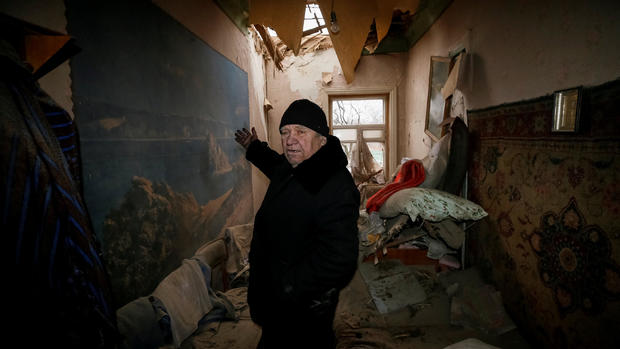Ukraine, rebels agree to cease-fire deal
MINSK, Belarus -- Leaders of Russia, Ukraine, France and Germany on Thursday emerged from marathon 16-hour talks to announce a comprehensive peace deal for eastern Ukraine, but questions remained whether Ukraine and the pro-Russian rebels have agreed on all of its terms.
Russian President Vladimir Putin told reporters that the agreement envisages a cease-fire that will be effective starting from the start of the day Sunday (2100 GMT or 4 p.m. EST Saturday) as well as a special status for the rebel regions, provisions on border controls and humanitarian issues.
Ukrainian President Petro Poroshenko, however, denied that there was any agreement about autonomy in eastern Ukraine.
The White House said the agreement could be a significant step toward peacefully resolving the conflict and urged all sides to take "immediate, concrete steps" to fulfill the commitments.
"The true test of today's accord will be in its full and unambiguous implementation, including the durable end of hostilities and the restoration of Ukrainian control over its border with Russia," White House press secretary Josh Earnest said.
Meanwhile, both rebels and government troops reported ongoing fighting across eastern Ukraine. The conflict has claimed more 5,300 lives since April.
Putin told reporters that he and Poroshenko disagreed on assessing the situation in a key flashpoint, and he blamed Ukrainian officials for delaying progress on the peace deal by refusing to negotiate directly with the separatists.
"Unfortunately, the Kiev authorities refused to have direct contact with representatives of the Donetsk and Luhansk republics. Despite the fact (that) they are not recognized, one has to face the realities -- if you want to work for a long-term solution, you need to work in direct contact," chided Putin, adding that in spite of the hurdles, "we have been able to agree a lot of things."
The government-controlled town of Debaltseve, a key transport hub between the two main rebel-controlled cities in the east, has been the focus of intense fighting in recent weeks as the rebels sought to encircle the Ukrainian troops there.
Putin said that the rebels consider the Ukrainian forces surrounded and expect them to surrender, while Ukraine disagrees with that.
He added that they agreed with Poroshenko to clarify the situation. Putin urged the warring parties to show restraint.
Poroshenko said the parties agreed to help Ukraine reclaim the control of the border with Russia.
He told reporters that heavy weaponry will be withdrawn from both sides by 31-43 miles in the next two weeks. He also said that the parties agreed to make sure Ukraine reclaims the control of all of the country's border, some of it is now controlled by Russia-backed separatists.
Hollande said he and Merkel were committed to helping verify the cease-fire process in Ukraine, along with the Russian and Ukrainian leaders.
Speaking after the talks, Hollande said the announcement of a new cease-fire deal had come as a "relief to Europe." A previous cease-fire agreed in September fell apart as Ukrainian government forces and Russian-backed rebels both tried to gain more ground.
"We came to an agreement, an agreement on a cease-fire and on a global political settlement of the Ukrainian conflict," Hollande said. "That global settlement will include all issues, from the cease-fire to the control of the border, to decentralization, and, of course, the pullback of heavy weapons and resuming economic relations."
He also praised Putin for applying "pressure as much as necessary on the separatists."
"We were presented with various unacceptable conditions of withdrawal and surrender," Poroshenko told reporters after the talks. "We did not agree to any ultimatums and stated firmly that the cease-fire that is announced is unconditional."
Poroshenko also said the documents signed envisage the withdrawal of all foreign troops and militants from Ukraine -- a reference to the soldiers and weapons that Ukraine and the West say Russia has sent into eastern Ukraine to back the rebels. Moscow has denied the accusations, saying Russians in eastern Ukraine were volunteers, but the sheer number of sophisticated heavy weapons in rebels' possession belies the denial.
Amid the escalation of violence in recent months, President Obama signaled early this month that he was reconsidering his long-held view that arming Ukrainian troops to help them take on the Russian-backed separatists would only result in a more deadly conflict.
President Obama said Monday that although he has asked his advisers to look at all options to stop the Russian incursion into Ukraine, he has not yet decided whether to supply the Ukrainian military with lethal weapons, and the U.S. would continue to pursue a diplomatic resolution to the crisis in the meantime.
"Now it is true that if in fact diplomacy fails, what I've asked my team to do is to look at all options, what other means can we put in place to change Mr. Putin's calculus, and the possibility of lethal defensive weapons is one of those options that is being examined. But I have not made a decision about that yet," Mr. Obama said at a press conference with German Chancellor Angela Merkel.
Merkel, her French counterpart Francois Hollande and other European leaders have made it clear they do not believe military intervention or adding more weapons to the crisis in eastern Ukraine can bring peace, and that diplomacy is the only way out of the crisis.
On Wednesday, a top U.S. military commander in Europe said the U.S. military was planning in March to start training Ukrainian soldiers who are battling the separatists.
U.S. Army Europe Commander Lt. Gen. Ben Hodges said a battalion of U.S. soldiers would train three battalions of Ukrainians from the Interior Ministry at the Yavariv training center in the western Ukrainian city of Lviv.
